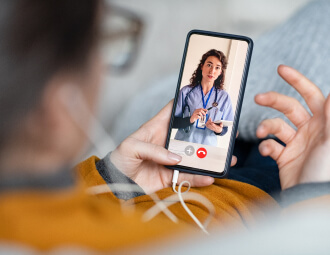Highlights
- Anxiety and stress commonly coexist with headaches.
- Anxiety headache is not a medical term.
- The primary headache types most often associated with anxiety are migraines and tension-type headaches.
- The symptoms of anxiety-related headache can vary depending on the headache type.
If you’ve landed on this page, you most likely have a headache, and you’re feeling anxious. You’re looking to understand whether there is a link between the emotion and your physical pain. This article will answer your question and provide information on prevention and treatment.
The Connection Between Anxiety and Headaches
Does anxiety, or stress, cause headaches? The answer is that it goes both ways.
Anxiety can give you a headache, but headaches can also lead to anxiety. Studies show that people with recurrent or chronic headaches, especially migraines, are
Either way, there is a strong connection. The Association of Migraine Disorders reports:
- More than 5 out of 10 people with migraine will be diagnosed with an anxiety disorder at some stage.
- Anxiety also increases the risk of having more frequent migraines.
Strictly speaking, there actually isn’t a medical term for “anxiety headache.” But rather certain types of headaches are associated with anxiety.
What an Anxiety-Related Headache Feels Like
Usually, the symptoms and location of an anxiety-induced headache are as follows:
- A tightening or squeezing, mild to moderate pain
- Some sensitivity to light or sound
- Pain can affect both sides of the head, the temples, the forehead, or the back of the head or neck
Sometimes, this varies, depending on the type of primary headache.

Types of Headaches Linked to Anxiety
Tension-Type Headaches (TTH)
Almost everybody, more than 70% of people, gets tension headaches sometime in their lives. It’s thought to be the most common anxiety-induced headache type.
You might be experiencing an anxiety tension headache
- On both sides of the head
- A pressing, squeezing, or tightening feeling
- Not pulsating or pounding
- Mild or moderate in severity
- Everyday activity, for example, walking or climbing stairs, doesn’t make it worse
- Possible sensitivity to light or sound, usually not both
The good news about a TTH is it’s usually over in
Migraine Headaches
Between
Here’s
- Usually one-sided
- Described as pulsating, throbbing, or pounding
- Average to severe pain
- Made worse by everyday activity
- People typically feel nauseous and are sensitive to light and sound
Unfortunately, these migraine attacks last at least 4 hours, and up to 72 hours.
Cluster Headaches
Cluster headaches
- One-sided
- Usually in or above the eye
- Constant, explosive, and can’t be any worse: 10 out of 10
- So bad that people can’t stay still, they pace or rock.
There are a few other specific signs that doctors will look out for, such as a runny or blocked nose, red or watery eye, or sweating on the same side as the pain.
Luckily, this type of headache is much less common.
Why Anxiety Triggers Head Pain
Anxiety can make your head hurt in different ways. This condition impacts your thoughts and emotions, brain processes, and behavior.
Common Mechanisms
Fight-or-Flight Muscle Tension
If the person with anxiety is scared, this triggers the
Anxiety Sensitivity
Emotions like worry and irritability
Alexithymia
This fancy word basically means that people who are emotionally distressed have difficulty identifying and describing their feelings or emotions. As a result, they often experience
Common Behavioral Triggers and Lifestyle Risk Factors
People with anxiety sometimes have lifestyle triggers and behaviors that may increase the risk of headaches:
- Not sleeping enough or oversleeping
- Consuming alcohol frequently
- Smoking nicotine frequently
- Poor posture
- Increased work hours or pressure
- Sitting long hours at a desk
- Looking at a screen the entire workday
- Increased consumption of caffeine due to low motivation or fatigue
- Crying or blowing their noses more than usual
- Poor dietary self-care
- Eating processed foods containing preservatives
- Skipping meals and not drinking fluids regularly
Avoiding or correcting these triggers and risks might prevent headaches.

Panic Attacks & Headaches: Before, During, and After
Let’s quickly look at the mechanisms of headaches during panic attacks.
Before
As with all anxiety disorders, patients with panic disorder may have underlying anxiety sensitivity and alexithymia, generally predisposing them to headaches.
During
A panic attack is an extreme fight-or-flight response that causes muscle tension-type headaches complicated by hyperventilation. This fast ‘overbreathing’ causes changes in carbon dioxide levels, which can alter cerebral blood flow and may contribute to headache symptoms.
After
A headache after an anxiety attack might result from the ‘adrenaline crash’ for two reasons:
- The adrenaline surge during the stress response
can temporarily mask pain[9] ; when it drops, the person becomes aware of the headache. - The brain’s blood vessels open up again, and blood flow rushes in, causing a pulsating headache.
We’ll look at when to see a doctor immediately in the final article section. But first, here are a few tips on what to do when you’re experiencing an anxiety headache.
How to Stop an Anxiety Headache
Try these strategies immediately; hopefully, they will stop the headache or decrease its intensity:
- Try a deep-breathing technique: breathe in for 4 seconds, hold for 4 seconds, breathe out for 4 seconds, hold for 4 seconds, and repeat. It
slows the fight-or-flight response[10] . - Drink a big glass of water in case you’re dehydrated.
- Eat something sugary if you’ve skipped a meal.
- Stop what you’re doing, sit down, and rest.
- Lie down in a dark, quiet room for at least 30 minutes.
- Apply heat to painful muscles.
- Gently stretch your neck and shoulders.
Certain pain-relieving medications, such as acetaminophen and ibuprofen, are available over the counter. They are generally safe to use and might help in the case of a tension-type anxiety headache.
Recent studies show that acetaminophen 1,000 mg and ibuprofen 400 mg
Unfortunately, these self-help techniques are only temporary; if your headaches are anxiety-related and ongoing, you will need a long-term plan to deal with the anxious feeling and its triggers.
Treating the Root Cause: Managing Anxiety to Reduce Headaches
It’s advisable to see a mental health professional to guide you on an appropriate anxiety treatment plan, which may involve therapy, medication, or both.
Therapies
Relaxation techniques not only help to reduce anxiety but also relieve muscle tension.
Mindfulness practices teach you to
Cognitive-behavioral therapy (CBT) is a type of talk therapy that helps change your actions by reframing negative emotions related to specific thoughts into positive ones.
Medications
Effective treatment for anxiety headaches would usually involve anti-anxiety medications to address the root cause.
Selective serotonin reuptake inhibitors (SSRIs) and serotonin-norepinephrine reuptake inhibitors (SNRIs) are both considered
first-line options[12] for generalized anxiety disorder (GAD) treatment.Examples of SSRIs are fluoxetine, sertraline, paroxetine, escitalopram, and citalopram. Duloxetine is an SNRI that might be particularly useful if pain syndromes co-exist with GAD.
- Benzodiazepines are not typically prescribed for headaches specifically, but may be used for severe panic attacks or breakthrough anxiety symptoms. Note that these medications are only for short-term or occasional use, as they have
addiction potential[12] . - Tricyclic antidepressants (TCAs) are sometimes used to treat anxiety, but have many side effects. Interestingly, the TCA amitriptyline is the
most effective and well-studied preventive medication for TTH[2] .
These are often combined with therapies to manage pain symptoms until anxiety is controlled. A healthcare professional will help determine the best combination of options and supervise treatment progress.
Prevention Toolkit: Build Your Personal Plan
The first step to preventing headaches is recognizing triggers and identifying the headache type.
Do this with a ‘headache diary’; make note of the following:
- When does it happen?
- What’s happening around you when it does?
- What are you thinking?
- How are you feeling?
- Where is the pain?
- What type of pain is it: squeeze, throb, or explosion?
- How severe is the pain?
- Other than the pain, do you have any other physical symptoms?
- How long does it last?
Next, commit to lifestyle changes that reduce the risk of headaches.
- Establish a good sleep routine and get enough sleep
- Cut alcohol, nicotine, and caffeine out of your life
- Plan for healthy meals by shopping once a week for fresh ingredients
- Keep a jug or bottle of water on your desk
- Practice good posture
- See a biokineticist or physical therapist
- Get a chair designed for desk work, or a standing desk
- Avoid eye strain
- Have your eyes checked in case you need glasses
- Take screen breaks
- Use an antiglare computer screen or glasses
Diagnosis & When to See a Clinician
There are occasions when you shouldn’t try any self-help strategies and immediately seek medical attention, if you have
- It’s a new headache type or pattern, especially after the age of 50
- Fever or a stiff neck
- You are pregnant or have just had a baby
- Have bumped your head, even in the last month
- You’re confused, have seizures, numbness or weakness, or changes in speech or vision
- It wakes you up at night
- It came on out of nowhere and is severe, like a thunderclap
- It’s worse with coughing or straining to pass stool
- You have a cancer history or a weak immune system
Usually, if none of these red flag symptoms are present, scans are not necessary.
Another reason to see a doctor would be if you’re having anxiety headaches every day. First, a healthcare provider will exclude
- Sinusitis
- Ear infections
- Temporomandibular joint dysfunction
- Dental problems
- Neck arthritis
- Medication overuse headaches
- Infections
Next, they will confirm if you have an anxiety disorder and work out a personalized treatment plan.
Get Anxiety Treatment Online
MEDvidi’s team of licensed healthcare providers can help you through an online consultation. Book your video appointment today to get your anxiety symptoms checked and receive an individualized treatment plan.












